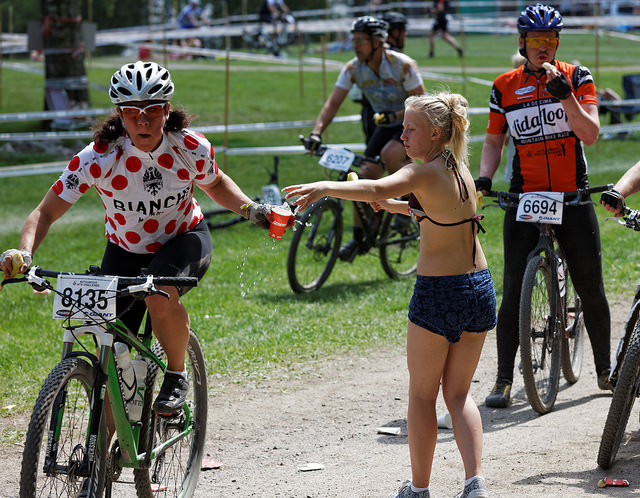Cycling and Heat Stress
Posted by Kitty on Jun 1st 2016
What is heat stress?
Heat stress is when the body’s ability to cool itself becomes stressed because of exposure to high temperatures and humidity. According to the CDC.gov website, “Heat stress can result in heat stroke, heat exhaustion, heat cramps, or heat rashes.” Those at greater risk of heat stress include people who are overweight, have heart disease, high blood pressure, are taking certain medication, or 65 years of age or older.
What is the connection between cycling and heat stress?
Summer is upon us! This means higher temperatures and a drastic difference in humidity for many of us around the world. Spring is picture-perfect cycling weather and summer can bring about high temperatures that are dangerous. If a cyclist is unprepared, they could find themselves dehydrated, lightheadedness, faint, experience respiratory trouble, or heat stroke, among many things.
 CC image courtesy of Viktor Karppinen on Flickr
CC image courtesy of Viktor Karppinen on Flickr
https://creativecommons.org/licenses/by-nc-nd/2.0/
If you’re going to take one thing away from reading this, let it be: healthy hydration.
In some places, just standing outdoors will cause sweating. The body sweats as a way to keep itself cool in high temperatures. A cyclist cycling in hot weather has the potential to lose up to 2 quarts of body sweat per hour. Your body needs these fluids to be replenished in order to stay hydrated.
Summer cycling Heat Stress Prevention tips
- Endurance training: start slow, building gradually upon your endurance in terms of how much/ how far you cycle and with how much intensity. Your body will adapt gradually, and adjust.
- Wear appropriate clothing and gear. Helmets for cycling come with a different array of options. We highly recommend Bern helmets, as many of them have detachable linings to alternate between hot and cold environments. Breathable, lightweight clothing, absorbent socks, and appropriate cycling shoes are all highly recommended. Eyewear that won’t slip and fall off during your rides are also important to consider
- Sunscreen! It’s important to protect your skin as well, try to stay away from oil based sunscreens,
- Time of day. Unless there is no choice, try to avoid riding when it is the hottest time of day. The most ideal is to cycle in the afternoon, when you can cool off as the day cools off.
- Healthy Hydration. If you are not replenishing the water you lose through sweat, you will dehydrate. Drink before, during, and after your ride. Also consider your electrolytes: drinking electrolyte beverages has been found to rehydrate faster than plain water.
Listen to your body and don’t push it farther than it wants to go. Always stay hydrated, situational awareness is key.
